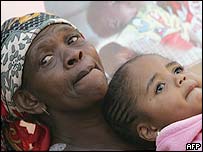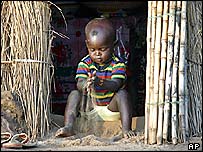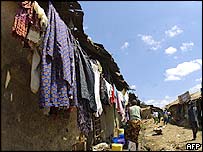World leaders meeting for the G8 summit at Gleneagles in Scotland have agreed a package of aid and targeted debt relief for Africa.
They pledged to increase aid to the developing world by $50bn (£28.8bn) and to write off the debts of Africa's 18 poorest countries, although African nations had called for the debts of all Africa to be cancelled.
BBC correspondents in key African nations assess what the G8 agreement means where they are.
Barnaby Phillips : South Africa

The G8 agreed to make anti-Aids drugs widely available across Africa
|
African leaders had waited a long time for the G8 summit, and were worried that the London bombs would take the focus away from their continent at the last moment.
In the event, their fears were not realised, with Tony Blair apparently determined that Africa should remain top of the agenda.
Mr Blair said that agreements reached at Gleneagles gave "real hope" that African poverty could be ended.
The increases in aid will be welcomed across Africa, although it will take time for African governments, and their people, to assess to what extent they will benefit.
Africa will also be looking for more detail on promises to write off the debts of the poorest countries.
Fourteen African countries already knew they were going to benefit from debt cancellation, while others will now be waiting anxiously to see whether they are included.
The biggest disappointment will be with the vague commitments the G8 has reached on trade - even Mr Blair admitted that he would have liked to have gone further here, to reach agreements on specific dates for the phasing out of subsidies.
Cotton farmers in West African countries like Burkina Faso and Mali, and sugar cane farmers in southern African countries like Swaziland and Malawi, will derive little comfort from the G8 meeting.
Anna Borzello : Nigeria
One in five Africans is Nigerian, and 70% of the population live on less than a dollar a day, which means any attempt to deal with poverty in Africa has to deal with the West African giant.

In Nigeria, the reality of most people's lives is extreme poverty
|
The Nigerian President, Olusegun Obasanjo, who is also the chairman of the African Union, has been manoeuvring since the start of the year to take advantage of the mood surrounding the G8.
His goal has been to convince creditor nations that Nigeria deserves debt relief, even though it is oil-rich and one of the most corrupt countries on the planet.
He was granted his wish last month, with a 60% debt write-off.
It is a move that has been welcomed by Nigerians, who feel it is unfair to pay back loans which were largely given to military dictators.
But there is also scepticism about whether the money saved will ever be used to benefit the needy.
Many feel the root cause of poverty in Nigeria is not a lack of aid, not the draining effects of debt and not even, in an oil-reliant economy, unfair trade terms.
Instead, it is the way that the estimated $360bn (£207bn) Nigeria has earned from crude oil since the 1960s has been squandered or stolen by successive regimes.
Prime Minister Tony Blair's efforts to put Africa high on the G8 agenda have largely been met here with pleasant surprise.
But most Nigerians, when asked the best way to tackle poverty, invariably answer: "good leadership".
Adam Mynott : Kenya
There have been just two cheers from Africa for the G8 outcome.
The doubling of annual aid for Africa to $50bn has been widely welcomed, but there are concerns about whether this commitment, due to come into operation by 2010, will be followed through.

In Kenya's slums, people struggle from day to day
|
Kenyan Finance Minister David Mwiraria said: "Intentions and actualisation are not the same thing. We would like to see a situation where there is money now."
Other critics have called the promises too vague, but the president of the African Union, Nigerian President Olusegun Obasanjo, who attended the meeting in Scotland, said he was satisfied with the Gleneagles deal.
He said the problems facing Africa were being "realistically and acceptably" addressed by the international community.
He went on to pay tribute to the British prime minister.
"The meeting of the G8 leaders and African leaders in Gleneagles is a great success and we thank and congratulate Prime Minister Tony Blair for the success achieved."
Many Africans were looking to Gleneagles to tackle what they see as the main obstacle standing in the way of the continent's development - an end to agricultural subsidies in the developed world, which cripple African producers' attempts to earn money on the international market.
The Zambian Deputy Finance Minister Felix Mutati said: "What we need most is fair trade because our farmers cannot compete with farmers in the West.
"The whole issue of trade hinges on farm subsidies and the quicker this is resolved the better."
As for climate change, this is a problem that poses Africa serious problems.

